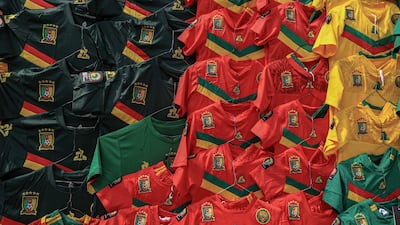It is well outside the top 10 of Africa’s national economies. Its population is dwarfed by its neighbour, Nigeria. But there is one measure of status that Cameroon relinquishes reluctantly. In the continent’s favourite sport, the so-called Indomitable Lions regard themselves as the greatest trailblazers.
No African country has been represented at more World Cups. None have gone further in a World Cup than Cameroon in 1990 when they reached the quarter-final of a tournament forever remembered for its opening-day coup: Cameroon 1, Diego Maradona’s Argentina 0.
But those achievements can seem child’s play next to the challenge of hosting an outsized event that brings together more than 650 elite sportsmen in a time of pandemic, to a region where there are heightened security fears and the resentful opposition of club football’s monied powerbase is noisy.
The 33rd Africa Cup of Nations has had a difficult, tortuous path to Sunday’s kick-off. The 2019 edition was first awarded to Cameroon in 2014, then rerouted to Egypt at late notice when preparations in the west African country were deemed behind schedule. The format had swelled in the meantime, up from 16 teams to 24.
Bigger setbacks were yet to come. A global public health emergency meant Cameroon had to wait still longer to host. It eventually does so half a century after staging its last Afcon.
Covid-19 will impose numerous restrictions on the four weeks ahead, with crowd capacities restricted for most games to 60 per cent of stadiums that have been constructed or rebuilt for the event. As for the players, any head coach who completes the tournament without amending his line up to cope with positive tests and the obligatory self-isolation of key performers will be a lucky one indeed.
Days ahead of Sunday’s opener - Cameroon against Burkina Faso - several squads have concerns over the availability of key individuals and the possible spread of infections. Gabon reported that their two most worldly footballers, Pierre-Emerick Aubameyang and Mario Lemina, had been quarantined ahead of their Group C fixture against Comoros.
Just as wearying for coaches have been the tenacious arguments of European club employers about whether this Afcon should even take place, and then about the date they should release their called-up players.
Well over 250 of those chosen to take part make their living with clubs outside Africa. Because the 2021 Afcon was postponed from last summer and reassigned to January and February, key personnel will be leaving league title races and relegation dogfights in mid-season for up to a month.
Clubs are jealously protective. African stars enrich the standards of European clubs more than ever. Liverpool without Mohamed Salah and Sadio Mane become a far paler shade of red, Paris Saint-Germain shorn of Achraf Hakimi cease to be jet-propelled down their right flank. Napoli and Chelsea concede much of their defensive authority when they cannot line up Kalidou Koulibaly or Edouard Mendy.
In a compacted club calendar, the effect of a major mid-season international tournament is far-reaching. UAE's Pro League clubs Al Ain and Al Nasr will be without two leading lights, Morocco striker Soufiane Rahimi, and Ryan Mendes, of Cape Verde.
Amid aggressive lobbying, clubs gained an extra week of availability which means the Afcon contenders, already coping with Covid-19 protocols, have had less time to practice together. If they look rusty, short of fluency in the group stage games, that will be among the causes.
Yet Afcon really needs to be a good spectacle, an advertisement for the excellence of Africa’s talent. Covid shutdowns have damaged a sport whose domestic leagues in many countries were already fragile, audiences drawn away from local stadiums towards televised football from overseas.
“This will be the best Afcon ever,” pronounced the new president of CAF, Patrice Motsepe, the governing body of African football, as he gave his blessing to Cameroon’s readiness as host.
Motsepe, a South African mining magnate, knows it will be quirky in some ways. He will not be watching his compatriots in action, South Africa and DR Congo among the bigger nations who failed to qualify. Instead, there is novelty: The minnows from the Comoros islands make their first Afcon appearance.
Algeria, the defending champions, look the team to beat, spearheaded by an in-form Riyad Mahrez and undefeated since well before their triumph in the final in Cairo in 2019. The runners-up then, Senegal, have the means, especially if Koulibaly is match-fit after his injury lay-off, to claim a first Nations Cup prize, while Salah’s Egypt and Hakimi’s Morocco arrive with great expectations.
But no squad will feel more urgently the pressure to win than the 2017 champions, Cameroon. While the world may be watching how the country deals with hosting a tournament beset with challenges, its footballers are charged with maintaining historic status, and being indomitable.





















